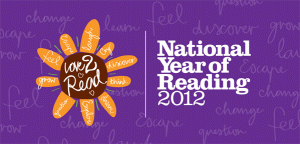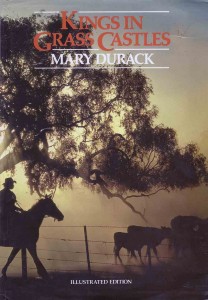Celebrating National Year of Reading 2012
A great read “Kings in Grass Castles” by Mary Durack
I’ve just finished reading Mary Durack’s “Kings in Grass Castles” I’m a little ashamed to admit not having read it sooner – now wish I had…
One passage I particularly enjoyed described their love of horses. “Their passion for horses amounted almost to a cult. Their conversation was mostly of horses and of how they came into possession of the brave mounts they rode – one from a brumby mob mustered along the Murrumbidgee, another a thoroughbred that belonged to a bushranger, another bought, near perishing, from a pound. With horses trained to ‘turn on a plate’, to wheel and dodge, they mustered cattle in hundreds from gully to scrub…”
Equitainment has the DVD available now www.equitainment.com.au From what I hear it’s release on DVD has been hugely popular.
“Kings in Grass Castles” by Mary Durack – First published in Great Britain 1959
Kings in Grass Castles is basically the biography of Patrick Durack (1834-1898), Mary’s grandfather. Dirt poor tenant farmers in County Clare, Ireland and the story of the surviving members of his after the famine of the 1840s when they migrated to Australia in 1853.
Within two months of reaching the Goulburn district, his father was accidentally killed. Determined to change the family fortunes, Patrick went to the Ovens River diggings in Victoria and returned in 18 months with £1000. With that, he began to establish the Durack pastoral empire. By the 1870s he has claimed 44,000 square kilometres of land in south-west Queensland, and his original cattle herd had grown from 100 head to 30,000. Eventually he is the owner of hotels, a butchery and town properties. To top it off he cemented his fortune by selling off land blocks to incoming settlers. In the space of about 45 years, Patrick Durack developed three major pastoral areas in Australia, Goulburn (NSW), Coopers Creek (Queensland) and the Ord River in Western Australia.
We all know of the brutal treatment of the tenant farmers in Ireland by the English landlords and the Durack story outlines how they were exploited. But when it comes their turn to behave with empathy they behaved just like the English. You also see how the changes between the family and the Aboriginal people sadly deteriorates. Others have written about the contradiction about who the Duracks were, and what they became, and how owning title to land encouraged the family as kings of a grass monarchy to do what they pleased. In saying this it’s a fascinating read and especially admirable how both the men and women in the Durack family played an equal part in the families success. They leave me in awe of what they achieved even by today’s standards
Towards the end of the book Mary’s grandfather is dying and distressed by his dreams. “All the little kings in their grass castles, Mary, and the wind and the water sweeping them away. The gullies are creeping up about the house, my dear. Tell the boys…” He left his life with only his immortal soul, he could not take his riches and you were not left without any doubt about how his Australia was forged.


Leave a Reply